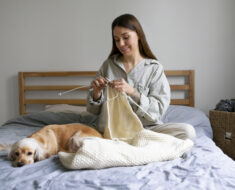Do you share your bed with your furry companion? While it may seem like a cozy idea, you might want to reconsider.
In this article, we’ll explore the reasons why you shouldn’t let your dog sleep in your bed and the potential implications it can have on your sleep quality and overall health. Here why does your male dog pee on your bed?

Here you go!
6 hidden reasons why you shouldn’t let your dog sleep in your bed?
Here look up at 6 reason why your shouldn’t let your dog sleep in your bed.
1. A Dog Sleeping In Your Bed Can Disturb Your Sleep
Allowing your dog to sleep in your bed can disrupt your sleep. Dogs have different sleep patterns than humans, and their movements, snoring, or even the need to go outside can disturb your rest.
They may hog the bed, steal the covers, or unintentionally wake you up during the night. This can lead to sleep deprivation, daytime drowsiness, and overall reduced sleep quality.
It’s important to prioritize your own sleep to maintain optimal health and well-being.
2. Sleeping With Your Dog May Aggravate Allergies or Asthma
Allowing your dog to sleep in your bed can worsen allergies or asthma symptoms. Dogs can carry allergens such as dander, saliva, or pollen on their fur, which can trigger allergic reactions or respiratory issues.
Even if you’re not directly allergic to dogs, their presence in your bed can introduce these allergens into your sleeping environment.
This can result in sneezing, congestion, itching, or difficulty breathing, making it challenging to get a good night’s sleep.
Keeping your dog out of your bed can help alleviate these symptoms and promote better respiratory health.
3. Dog Sleep Reactivity Could Lead to Injury
Allowing your dog to sleep in your bed can pose a risk of injury due to dog sleep reactivity. Dogs may experience involuntary movements or twitches during sleep, especially during rapid eye movement (REM) sleep.
These sudden movements can lead to accidental scratching, kicking, or biting, which may inadvertently harm you or your sleeping partner.
By keeping your dog off the bed, you can mitigate the potential for sleep-related injuries and ensure a safer sleeping environment for both you and your pet.
4. Sleeping With Your Dog Can Make You Sick
Allowing your dog to sleep in your bed can increase the risk of getting sick. Dogs can carry bacteria, parasites, or other pathogens on their fur or paws, which can be transferred to your bedding. Here look up why does your dog lick you before bed?

This can potentially lead to infections or illnesses, such as skin infections, gastrointestinal issues, or even zoonotic diseases. Close proximity during sleep can facilitate the transmission of these pathogens.
Maintaining a separate sleeping space for your dog helps minimize the chances of contracting any potential illnesses and promotes better overall hygiene and health for both you and your pet.
5. Dogs Can Carry Parasites
Allowing your dog to sleep in your bed can expose you to the risk of parasites. Dogs can harbor various parasites, such as fleas, ticks, or mites, which can infest your bedding and pose a threat to your health.
These parasites can bite or feed on human blood, causing discomfort, itching, and potential transmission of diseases.
By keeping your dog out of your bed, you reduce the likelihood of introducing parasites into your sleeping environment and minimize the associated health risks for both you and your pet.
6. A dog might have allergies you
Allowing your dog to sleep in your bed can potentially expose you to their allergies. Just like humans, dogs can have allergies to various substances, such as pollen, dust mites, or certain foods.
If your dog has allergies, their presence in your bed can introduce allergens into your sleeping environment, triggering allergic reactions in you. These reactions may include sneezing, itching, watery eyes, or skin irritations.
By keeping your dog out of your bed, you can minimize the risk of being exposed to allergens and maintain a healthier sleep environment for yourself.
Now let’s see does letting a dog sleep on your bed promotes aggression. Here how to clean a dog bed?
Does Letting a Dog Sleep On Your Bed Promote Aggression?
Letting a dog sleep on your bed does not necessarily promote aggression. Aggression in dogs is influenced by various factors such as genetics, socialization, training, and individual temperament.
Sleeping arrangements alone are not a direct cause of aggression. However, it’s important to establish and maintain clear boundaries and rules to prevent any behavioral issues.
If a dog displays aggressive behavior, it should be addressed through proper training and behavior modification techniques.
Consistency, positive reinforcement, and seeking professional guidance can help address any aggression concerns, regardless of whether the dog sleeps on the bed or not.
Should Your Dog Sleep In Your Room?
Whether or not your dog should sleep in your room depends on personal preference and individual circumstances. There are benefits to having your dog sleep in your room.
It can provide a sense of security and companionship for both you and your pet. It may also help in monitoring your dog’s behavior and attending to their needs during the night.
However, some people prefer not to have their dog in the bedroom due to allergies, sleep disruptions, or personal space preferences.
Ultimately, it’s important to consider your own comfort, the needs of your dog, and any potential factors that may affect sleep quality before deciding whether or not your dog should sleep in your room.
How to sleep with your dog? If you want to
Set some boundaries
To sleep comfortably with your dog, it’s crucial to establish boundaries. Start by designating a specific area for your dog, such as a dog bed or a designated spot on the floor beside your bed.
Train your dog to understand this boundary and reinforce it consistently. Use positive reinforcement techniques to encourage your dog to stay in their designated sleeping area throughout the night.
By setting clear boundaries, you can ensure that both you and your dog have a comfortable and uninterrupted sleep while still enjoying the companionship of having them nearby. Here what to do when your dog chew your bed?
Teach your dog manners
When sleeping with your dog, it’s important to teach them good manners. Train your dog to follow basic commands like “stay” or “lie down.” This will help establish control and prevent unwanted behaviors during bedtime.
Encourage your dog to wait for permission before hopping onto the bed and teach them to respect your personal space. Reinforce positive behavior with treats and praise.
Teaching your dog good manners can ensure a peaceful sleep environment and strengthen the bond between you and your furry companion.
Keep toys out of the bedroom
When sleeping with your dog, it’s recommended to keep toys out of the bedroom. Having toys readily available in the bedroom can encourage your dog to engage in playtime during the night, leading to disruptions in sleep.

Instead, keep toys in a designated area outside of the bedroom where your dog can access them during waking hours.
This helps establish a clear association between the bedroom and restful sleep. By keeping toys out of the bedroom, you can create a calm and peaceful environment that promotes a good night’s sleep for both you and your dog.
Don’t let your dog sleep under the covers
When sleeping with your dog, it’s important not to let them sleep under the covers. Allowing your dog to burrow beneath the covers can pose risks such as restricted airflow, overheating, or accidental injury.
Instead, provide your dog with their own cozy bedding near your bed. This ensures their comfort while maintaining a safe sleeping environment.
If your dog insists on being close, consider using a separate blanket or a designated dog bed on the floor beside your bed.
By avoiding your dog sleeping under the covers, you prioritize their safety and enhance the quality of your sleep.
Wait until the dog has fully grown
When it comes to sleeping with your dog, it’s advisable to wait until they have fully grown. Puppies have a tendency to be more restless and may have accidents during the night.
Waiting until they are fully grown ensures better bladder control and reduces the risk of disruptions to your sleep.
Additionally, allowing your dog to reach adulthood before sleeping together allows you to establish training and boundaries, making the sleep experience more comfortable and enjoyable for both you and your pet.
Patience and waiting for your dog to mature can lead to a more harmonious sleep routine.
How to break your dog’s habit of sleeping in bed with you
To break your dog’s habit of sleeping in bed with you, follow these steps. Firstly, establish a comfortable sleeping space for your dog, such as a dog bed in another room.
Encourage your dog to use this bed by offering treats or toys. Next, gradually transition your dog out of your bed by providing positive reinforcement when they sleep in their designated area.
Consistency is key. Avoid giving in to their pleas to sleep in your bed. It may take time for your dog to adjust, but with patience and consistency, they will learn to associate their bed as their sleeping spot, breaking the habit of sleeping in your bed.
Related faq’s
What are the cons of letting your dog sleep in your bed?
The cons of letting your dog sleep in your bed include potential sleep disturbances, allergies or asthma aggravation, risk of sleep-related injuries, increased likelihood of getting sick, exposure to parasites, and the possibility of developing behavioral issues or dependency on sleeping in your bed.
Where Should Your Dog Sleep?
The ideal sleeping arrangement for your dog depends on personal preference and circumstances.
Options include providing a comfortable dog bed in a designated area, creating a cozy space in a separate room, or using a crate if preferred.
It’s important to choose a location that ensures your dog’s safety, comfort, and promotes a restful sleep environment for both of you.
Should my dog sleep in my bed?
Whether your dog should sleep in your bed is a personal decision. Consider factors such as allergies, sleep disruptions, personal space preferences, and potential behavioral issues.
If it doesn’t negatively impact your sleep or health, and you enjoy the companionship, it can be fine.
However, providing a separate comfortable sleeping area for your dog is also a valid option.
Does my dog want to sleep with me?
Whether or not your dog wants to sleep with you depends on their individual preferences and the bond you share. Some dogs naturally seek close proximity and enjoy the comfort of sleeping with their human companions.
However, other dogs may prefer their own space or have different sleeping habits.
Observe your dog’s behavior and body language to determine if they enjoy sleeping with you or if they prefer their own sleeping area.
Do I want to sleep with my dog?
Whether or not your dog wants to sleep with you depends on their individual personality and preferences. Some dogs enjoy the comfort and closeness of sleeping with their human companions, while others may prefer their own space.
Observe your dog’s behavior and body language, and if they consistently seek to be near you during sleep time, it’s likely they enjoy sleeping with you.
Ultimately, each dog is unique, so pay attention to their cues and preferences to determine what they prefer.
Conclusion:
While there are both pros and cons to letting your dog sleep in your bed, it’s important to consider factors such as sleep disruptions, potential allergies or health risks, and the potential for behavioral issues.
Ultimately, the decision should be based on what promotes the best sleep and well-being for both you and your dog.







I like the valuable info you provide in your articles. I will bookmark your blog and check again here frequently. I am quite certain I will learn many new stuff right here! Best of luck for the next!
Thanks Jimmy.. Happy to hear that…
what’s up how are you ? Your blog is very neat, lots of valuable information and gives me motivation to start my own blog. Do you have any tips you can give me ? Also Which template are you using as your design its very reputable.
Tristan, I’m awesome- Great to hear from you- However, Tristan it a custom theme. I’ve made myself. If you want i can help you. Message me at zilayhumaawan.com
You ought to be a part of a tournament for one of the highest quality blogs on-line. I am going to suggest this site!
WOW, Amaze what a big complement. Sure, Would to add up
Some truly nice stuff on this website , I like it.
Thanks Zonia, share it with other people
very good submit, i definitely love this web site, keep on it}
Thanks Everette, Stay connected
like to have you share some stories/information. I know my audience would value your work. If you are even remotely interested, feel free to shoot me an e
Lawrence, what type of stories/information you want to hear?
Hi there this is kinda of off topic but I was wondering if blogs use WYSIWYG editors or if you have to manually code with HTML. I’m starting a blog soon but have no coding know-how so I wanted to get guidance from someone with experience. Any help would be greatly appreciated!
Thanks for the comment- Well. i would recommend you- Use WordPress or any other CMS which doesn’t require your coding skills.. If you don’t know..
Very nice post. I just stumbled upon your blog and wanted to mention that I’ve truly loved surfing around your weblog posts. After all I’ll be subscribing to your rss feed and I’m hoping you write once more very soon!
Happy to hear that!